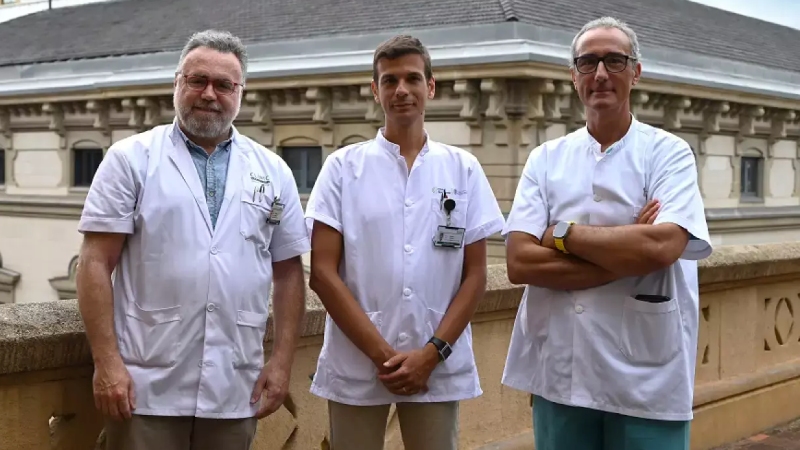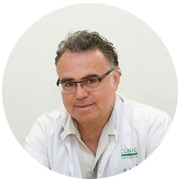21 July, 2023
Study demonstrates the usefulness of deep brain stimulation for the treatment of schizophrenia and bipolar disorder

An article that has recently been published in the Journal of Psychiatry and Mental Health, [1] in which various barnaclínic+ professionals have participated, has shown that deep brain stimulation, a surgical procedure that involves the placement of a device called a neurostimulator that sends electrical impulses to specific areas of the brain, it can be a safe and effective alternative for complex cases of patients with schizophrenia and bipolar disorder who do not respond to usual therapies.
This type of procedure has been used around the world to treat different brain pathologies, mainly for epilepsy and movement disorders, such as Parkinson’s disease. In fact, the Hospital Clínic has had a Functional Neurosurgery program for more than 20 years where this technique has been used since its inception and its effectiveness has been investigated. The experience gained through this program raised the possibility that patients with depression or obsessive-compulsive disorders, who do not respond to treatments, could also benefit from deep brain stimulation.
DEEP BRAIN STIMULATION, FOR THOSE CASES THAT DO NOT RESPONSE TO USUAL TREATMENT
The importance of this study also lies in the unmet needs of a good part of the population. We must not forget that about 30% of people with schizophrenia and 15% of those with bipolar disorder fit this profile in which they do not respond to the usual pharmacological treatment, and that they currently do not have alternatives that help them manage their illness. That is why a pilot program was launched to evaluate the effects of deep brain stimulation as a therapeutic strategy. The work, led by Miquel Bioque, an accredited researcher from the IDIBAPS Schizophrenia group, directed by Miguel Bernardo, involved four patients with schizophrenia and bipolar disorder resistant to treatment and was recently published by the Spanish Journal of Psychiatry and Mental Helth.
About 30% of people with schizophrenia and 15% of those with bipolar disorder do not respond to standard drug treatment and currently have no alternatives.
A PERSONALISED STUDY
“The electrodes were placed in different areas of the brain according to the symptoms, affective or psychotic, that each case presented and its evolution. Likewise, the characteristics of the electrical stimulus were also adapted to each patient”, says Dr Eduard Vieta, head of the IDIBAPS Bipolat and Depressive Disorders group, of the Psychiatry and Psychology Service of Clínic Barcelona, barnaclínic+ professional and last signatory of the article. In addition to Dr Vieta, Dr Jordi Rumia, a neurosurgeon who is part of the Parkinson’s and Movement Disorders Unit (UPTM) of the Clínic de Barcelona and barnaclínic+, and Dr Pedro Roldán, also a neurosurgeon from the Hospital Clínic of Barcelona and barnaclínic+, also participated in the study.
“The electrodes were placed in different areas of the brain according to the symptoms, affective or psychotic, that each case presented and its evolution. Likewise, the characteristics of the electrical stimulus were also adapted to each patient”
Dr Eduard Vieta, head of the IDIBAPS Bipolat and Depressive Disorders group, of the Psychiatry and Psychology Service of Clínic Barcelona, barnaclínic+ professional
In addition to conducting intensive psychiatric and surgical follow-up for a year to evaluate the efficacy and safety of deep brain stimulation, the researchers monitored patients through a mobile app and wearable device. The app collected mood symptoms, while the device recorded physical activity and sleep patterns. After this time, a notable and stable therapeutic response was observed in two of the four patients. The third showed a relevant relief of clinical symptoms. On the other hand, the fourth did not respond significantly. Therefore, it was possible to interrupt the maintenance electroconvulsive therapy sessions in the three responding cases. The good results also made it possible to reduce part of the pharmacological treatment.
For researchers, the finding constitutes initial evidence that the technique can be an effective and safe alternative to treat complex and treatment-resistant forms of schizophrenia and bipolar disorder. “This opens the door and gives hope for a particularly complex group of patients with schizophrenia or bipolar disorder”, says Dr Vieta. However, the study has some limitations, such as the small number of patients included, their different diagnoses or the short duration of follow-up, which will require continuing with the line of research.
“This opens the door and gives hope for a particularly complex group of patients with schizophrenia or bipolar disorder”
Dr Eduard Vieta
[1] Miquel Bioque, Jordi Rumià, Pedro Roldán, Diego Hidalgo Mazzei, Laura Montejo, Antonio Benabarre, Joaquín Gil Badenes, Javier Tercero, Eduard Parellada, Eduard Vieta. Deep brain stimulation and digital monitoring for patients with treatment-resistant schizophrenia and bipolar disorder: a case series. Revista de Psiquiatría y Salud Mental – Journal of Psychiatry and Mental Health. Online 26 June 2023. DOI: 10.1016/j.rpsm.2023.05.001


